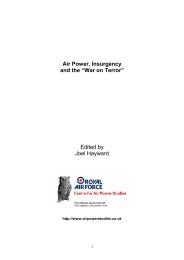Air Power, Insurgency and the âWar on Terrorâ - Prof. Joel Hayward's ...
Air Power, Insurgency and the âWar on Terrorâ - Prof. Joel Hayward's ...
Air Power, Insurgency and the âWar on Terrorâ - Prof. Joel Hayward's ...
You also want an ePaper? Increase the reach of your titles
YUMPU automatically turns print PDFs into web optimized ePapers that Google loves.
Chapter 9<br />
aversi<strong>on</strong>s to <str<strong>on</strong>g>the</str<strong>on</strong>g>ir employment. In c<strong>on</strong>trast, however, air strikes had been “almost riskfree.”<br />
The IAF had not lost an aircrew member since a Phantom was lost over Leban<strong>on</strong> in<br />
1986. The use of ground forces became a defensive-<strong>on</strong>ly kind of employment, a mentality<br />
reflected in <str<strong>on</strong>g>the</str<strong>on</strong>g> planned decommissi<strong>on</strong>ing of several brigades, decreases in <str<strong>on</strong>g>the</str<strong>on</strong>g> number<br />
<str<strong>on</strong>g>and</str<strong>on</strong>g> quality of tanks – <str<strong>on</strong>g>the</str<strong>on</strong>g> IDF had stopped producing its top-line Merkava tank – <str<strong>on</strong>g>and</str<strong>on</strong>g><br />
increased investment in l<strong>on</strong>g-range bombers. 358 When <str<strong>on</strong>g>the</str<strong>on</strong>g> goal was to retrieve two Army<br />
pers<strong>on</strong>nel, why risk getting more captured?<br />
Reinforcing <str<strong>on</strong>g>the</str<strong>on</strong>g> attractiveness of air power was that campaign after campaign seemed to<br />
validate it as a decisive instrument. C<strong>on</strong>flicts such as <str<strong>on</strong>g>the</str<strong>on</strong>g> Gulf War <str<strong>on</strong>g>and</str<strong>on</strong>g> Kosovo seemed to<br />
provide sweeping evidence in support of <str<strong>on</strong>g>the</str<strong>on</strong>g> argument that air power <str<strong>on</strong>g>and</str<strong>on</strong>g> high-precisi<strong>on</strong><br />
st<str<strong>on</strong>g>and</str<strong>on</strong>g>-off weap<strong>on</strong>s al<strong>on</strong>e could coerce an adversary <str<strong>on</strong>g>and</str<strong>on</strong>g> bring about victory. For example,<br />
without <str<strong>on</strong>g>the</str<strong>on</strong>g> use of any ground forces <str<strong>on</strong>g>and</str<strong>on</strong>g> with seventy-eight days of air strikes, <str<strong>on</strong>g>the</str<strong>on</strong>g> allied<br />
coaliti<strong>on</strong> had successfully forced <str<strong>on</strong>g>the</str<strong>on</strong>g> Serbian President, Slobodan Milosevic to fold, leave<br />
Kosovo, <str<strong>on</strong>g>and</str<strong>on</strong>g> accept G8 terms, seemingly providing an overwhelming success story for air<br />
power. Competing explanati<strong>on</strong>s have suggested that air power <strong>on</strong>ly in c<strong>on</strong>juncti<strong>on</strong> with<br />
<str<strong>on</strong>g>the</str<strong>on</strong>g> threat of ground forces, Russian withdrawal of support for Serbia, <str<strong>on</strong>g>and</str<strong>on</strong>g> <str<strong>on</strong>g>the</str<strong>on</strong>g> role of<br />
<str<strong>on</strong>g>the</str<strong>on</strong>g> Kosovo Liberati<strong>on</strong> Army, helped bring about an end to <str<strong>on</strong>g>the</str<strong>on</strong>g> Kosovo war. 359 But <str<strong>on</strong>g>the</str<strong>on</strong>g>se<br />
operati<strong>on</strong>s n<strong>on</strong>e<str<strong>on</strong>g>the</str<strong>on</strong>g>less helped reinforce <str<strong>on</strong>g>the</str<strong>on</strong>g> IDF’s growing attachment to air power as an<br />
antiseptic way to win wars at low cost. Reflecting <str<strong>on</strong>g>the</str<strong>on</strong>g> IDF’s strategic thinking <strong>on</strong> <str<strong>on</strong>g>the</str<strong>on</strong>g> utility<br />
of air power in <str<strong>on</strong>g>the</str<strong>on</strong>g> particular case of Leban<strong>on</strong>, Israeli leaders had “referred to Leban<strong>on</strong> as<br />
an updated editi<strong>on</strong> of <str<strong>on</strong>g>the</str<strong>on</strong>g> successful NATO aerial operati<strong>on</strong> in Kosovo in 1999.” 360 Lastly,<br />
domestic level factors had grown increasingly favourable towards ec<strong>on</strong>omic stability over<br />
state security, making high-risk strategies, such as those that might involve high casualties,<br />
less attractive. As <strong>on</strong>e analyst who visited <str<strong>on</strong>g>the</str<strong>on</strong>g> area noted: “Israeli governments in recent<br />
years have been so preoccupied with stoking <str<strong>on</strong>g>the</str<strong>on</strong>g> ec<strong>on</strong>omy that <str<strong>on</strong>g>the</str<strong>on</strong>g>y have been reluctant<br />
to take <str<strong>on</strong>g>the</str<strong>on</strong>g> steps necessary to ensure l<strong>on</strong>g-term security for fear of spooking <str<strong>on</strong>g>the</str<strong>on</strong>g> markets.”<br />
361<br />
In its place was a mindset in which success <str<strong>on</strong>g>and</str<strong>on</strong>g> failure were measured by <str<strong>on</strong>g>the</str<strong>on</strong>g> number<br />
of fallen soldiers, which was likely to be higher through <str<strong>on</strong>g>the</str<strong>on</strong>g> use of ground forces than<br />
through air power. Yet this measure inevitably c<strong>on</strong>strained opti<strong>on</strong>s available to achieve<br />
<str<strong>on</strong>g>the</str<strong>on</strong>g> state’s objectives. As <strong>on</strong>e Israeli critic noted: “if counting <str<strong>on</strong>g>the</str<strong>on</strong>g> fallen causes vacillati<strong>on</strong><br />
<str<strong>on</strong>g>and</str<strong>on</strong>g> indecisiveness, <str<strong>on</strong>g>and</str<strong>on</strong>g> annihilates ambiti<strong>on</strong> to deliver a strategic victory, how could gains<br />
become anything but losses, in terms of strategic objectives or loss of life?” 362<br />
The combinati<strong>on</strong> of <str<strong>on</strong>g>the</str<strong>on</strong>g>se factors – individual level preferences, strategic cultural changes<br />
after <str<strong>on</strong>g>the</str<strong>on</strong>g> First Leban<strong>on</strong> War, <str<strong>on</strong>g>the</str<strong>on</strong>g> apparent less<strong>on</strong>s of c<strong>on</strong>flicts of <str<strong>on</strong>g>the</str<strong>on</strong>g> 1990s, <str<strong>on</strong>g>and</str<strong>on</strong>g> aversi<strong>on</strong><br />
to casualties <str<strong>on</strong>g>and</str<strong>on</strong>g> instability – led Israeli military <str<strong>on</strong>g>and</str<strong>on</strong>g> civilian leaders to be c<strong>on</strong>vinced<br />
that air power generally <str<strong>on</strong>g>and</str<strong>on</strong>g> strategic bombing specifically could antiseptically win wars<br />
<str<strong>on</strong>g>and</str<strong>on</strong>g> make l<str<strong>on</strong>g>and</str<strong>on</strong>g> warfare “anachr<strong>on</strong>istic.” <str<strong>on</strong>g>Air</str<strong>on</strong>g> power was thought to provide a low-cost<br />
<str<strong>on</strong>g>Air</str<strong>on</strong>g> <str<strong>on</strong>g>Power</str<strong>on</strong>g>, <str<strong>on</strong>g>Insurgency</str<strong>on</strong>g> <str<strong>on</strong>g>and</str<strong>on</strong>g> <str<strong>on</strong>g>the</str<strong>on</strong>g> “War <strong>on</strong> Terror” 147





